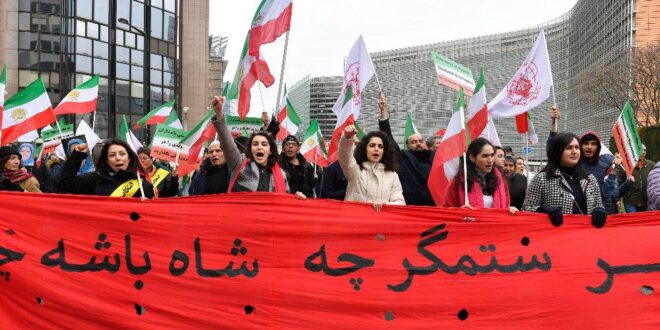The Islamic Republic no longer wants to work with Europe, but rather against it. Counterintuitively, the EU should still seek areas for potential cooperation in a hard-nosed, interest-driven way to create an opening into Iranian society.
September 16 will mark one year since the death of Mahsa Jina Amini in police custody, which sparked the “Woman, Life, Freedom” uprising in Iran. What amounted to a severe shock to the system of the Islamic Republic has so far mostly led to increased and more widespread repression inside the country: Hundreds have been killed—on the streets, in prisons, or from the gallows—and up to 20,000 people were arrested over the course of the months-long revolt.
While this first anniversary will gather some news coverage in Western media, it is not the most decisive element for developments in and around Iran. Instead, the country’s becoming a global challenge necessitates a wholesale rethink of the EU’s respective policy. That is why the coming year will be crucial not just for EU-Iran relations, but for Europe’s broader role.
For one, the longer-term process underway in Iran is one of regime consolidation in view of a necessary leadership succession. With the engineered election of a hardline president in 2021, Supreme Leader Ali Khamenei set out to stabilize the system in preparation for the time after his eventual death. In power for thirty-four years, he will turn eighty-five next spring, shortly after the Islamic Republic’s forty-fifth anniversary. And while he is said to be ailing, he keeps surprising outside observers with stable public appearances. His response to the revolt was a massive crackdown, leaving the regime more entrenched than before and allowing little room for Europe’s preferred approach of diplomacy and dialogue.
For another, Europe’s leadership on the 2015 Joint Comprehensive Plan of Action, also known as the nuclear deal, is waning. Because the EU and its most powerful members couldn’t effectively uphold the pact when the U.S. administration walked away from it in 2018, they lost any relevance in the eyes of Iranian officials. Currently, the talks on whether and how that agreement could be revived are led by Washington and Tehran, the two parties no longer abiding by it. They include bilateral issues like prisoner exchanges and the unfreezing of funds, thus sidestepping the EU’s role as the deal’s UN-mandated guardian. With a UN arms embargo against Iran expiring in October under the terms of the deal, all the Europeans can do is to keep the UN sanctions in their own book given Iran’s non-compliance and its increasing intransigence on nuclear inspections.
Closer to home, Tehran’s support for Russia’s war against Ukraine represents a direct threat to European security, fundamentally altering the continent’s relations with Iran. Besides supporting Ukraine and sanctioning Iranian drone companies and elements in the security sector, the EU needs to come to terms with Iran’s growing alliance with Russia. In addition to their military cooperation, the two countries also collaborate on sanctions evasion, whether on hydrocarbon or financial transactions, united in their desire to counter America’s global dominance.
Such developments, in turn, make Tehran a central part of the ongoing global realignment centered on China: Over the past six months alone, Iran negotiated an entente with Saudi Arabia with Beijing’s help, joined the Chinese-led Shanghai Cooperation Organisation, and just recently received an invitation to join the BRICS group of nations.
Iran, long proud of its unique position between East and West, both geographically and politically speaking, appears to have chosen sides now. If the nuclear deal of 2015 presented an opportunity for Iran to open up to Europe and, possibly, the United States, eight years later it is clearly oriented toward the East—or, rather, the non-West.
How to deal with Iran, therefore, is no longer a question of—take your pick—nuclear non-proliferation, human rights, or trade ties alone. Rather, it relates to how the EU sees itself in the midst of a changing global landscape.
The coming twelve months will be decisive not just for EU-Iran relations but for Europe’s global role. Here’s what the EU should do.
The Jina Amini revolt has subsided for now, but simmering unrest remains. This is particularly true for the country’s peripheral regions such as in Kurdistan and Baluchistan, which have seen disproportional numbers of arbitrary arrests and deaths. Due to an enormous degree of disenfranchisement and securitization, mass protests can reignite anytime. The EU must therefore draw the right conclusions from the past year to better respond to any future incidents—including if the next uprising isn’t women-led and feminist in nature. Brussels should establish a lessons-learned process on how to act in repressive contexts, and maintain close ties to civil society and human rights organizations to monitor the situation in Iran.
More generally, the EU needs to devise an approach to Iran as part of a new geopolitical constellation. The Islamic Republic no longer wants to work with Europe, but rather against it, and only cares about the United States due to the latter’s global power projection. Still, and somewhat counterintuitively, while accepting a worsening of bilateral relations, the EU should try to look at areas for potential cooperation, for example on climate, migration, and public health: not out of naivete, but in a hard-nosed, interest-driven way to provide an opening into Iranian society and for a possible future rapprochement.
Such an approach will, at times, put Europe at odds with the United States. Yet, devising different strategies to deal with certain issues need not undermine their alliance. Precisely because the future world order is now in the making, tangible input from the Europeans is needed if the transatlantic partnership is to thrive. An updated policy toward Iran is a good place to start.
 Eurasia Press & News
Eurasia Press & News


